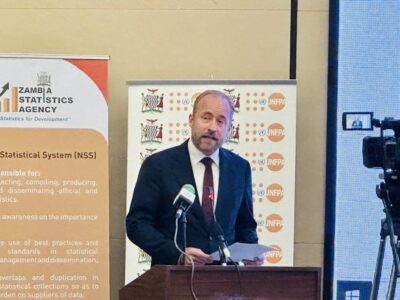The Zambia Chamber of Commerce and Industry (ZACCI) has painted a sobering picture of the challenges facing the nation’s private sector while urging the government to take decisive action to foster economic growth.
In his end-of-year review statement, ZACCI president, Anthony Kabaghe, outlined critical obstacles affecting sectors such as agriculture, energy, and mining.
He stressed the urgency of implementing reforms that would unlock private sector potential and bolster Zambia’s economic prospects.
Kabaghe stated the importance of building agricultural dams across the country, emphasizing their role in ensuring water security and boosting productivity.
He also urged the government to prioritise the development of a diversified energy mix and strengthen regional energy inter-connectors to address Zambia’s ongoing power challenges.
“The recent drought conditions have exacerbated the energy crisis, with profound impacts on industrial output and the broader economy.
“We need immediate measures to stabilise supply and reduce costs for businesses,” he explained.
In the mining sector, ZACCI called for the swift establishment of the Mineral Regulatory Commission, a body Kabaghe described as vital for effective resource management and national development.
He also highlighted the need for local content requirements to ensure Zambian businesses benefit directly from the country’s mineral wealth.
Kabaghe detailed several hurdles affecting businesses, including inconsistent power supply, escalating exchange rates, and overregulation.
Read more: Zambia’s external debt rises to $15.17 billion by Q2, 2024; up by 4.1% from December, 2023
These, coupled with limited access to affordable capital and an overabundance of police checkpoints, have hampered competitiveness and slowed economic growth.
“Local businesses are grappling with disruptions that increase operational costs and threaten sustainability,” he said.
The drought’s impact on agriculture has been equally severe.
Reduced productivity has led to higher food prices and threatened industries reliant on stable agricultural supplies, such as beef and cotton.
Looking forward, Kabaghe outlined two transformative initiatives ZACCI planned to launch in 2025.
The first is the formalization of Zambia’s predominantly informal economy.
Kabaghe described this as critical for economic development, explaining that integrating informal businesses into the formal economy would boost productivity, expand the tax base, and drive financial inclusion.
“No country has developed with a large informal sector. By reducing its size, we can accelerate Zambia’s economic transformation,” he said.
The second initiative is an annual State of Industry and Commerce Survey.
Kabaghe said the survey would collect crucial data to identify challenges and opportunities in key sectors, providing a roadmap for policy advocacy and innovation.
He also urged the government to leverage the Public Private Dialogue Forum (PPDF) to resolve pressing issues.
Kabaghe emphasised the need to extend dialogue to regional and district levels to address localised challenges, such as land rates and council by-laws.
“Dialogue should not be limited to the national level. It must reach every corner of the country to address specific concerns and foster development,” he said.
Kabaghe pleaded with the government to remain focused on creating an enabling environment for businesses.
He also reiterated ZACCI’s commitment to working with stakeholders to overcome the current challenges and position.
WARNING! All rights reserved. This material, and other digital content on this website, may not be reproduced, published, broadcast, rewritten or redistributed in whole or in part without prior express permission from ZAMBIA MONITOR.











Comments